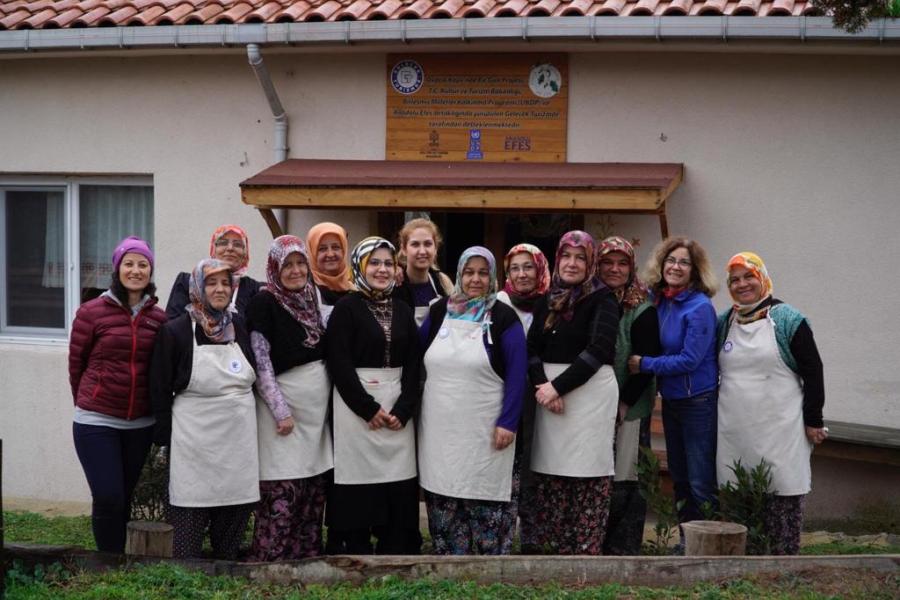Civil society supports rural women to get back on their feet following earthquakes
After the devastating earthquakes in Southeastern Türkiye, rural women and women’s cooperatives are trying to survive in the face of an economic standstill.
Playing a crucial role in empowering rural women in the region, civil society organizations are stepping in to help women rebuild their lives. These efforts by UN Women’s civil society partners bring hope to build back better in the region.
In a matter of moments, the Kahramanmaraş earthquakes on February 6, drastically changed the lives of millions in Southeastern Türkiye. Thousands of citizens lost their lives; millions are mourning their loved ones, their homes and hometowns. While six weeks have passed since the earthquakes hit, people are still in need of basic necessities such as shelter, blankets, food, heating and bathing facilities and there is also the question of access to livelihoods.
A brief by UN Women indicates that economic activity is at a standstill in the provinces that were hit by the earthquakes while survivors say that they need sustainable livelihood opportunities to maintain the basic needs of themselves and their households.
Nejla Demir is a 50-year-old farmer in the Seyhan district of Adana, one of the 11 provinces affected by the earthquakes. Demir, whose main source of income is animal breeding, used to sell milk and cheese in her neighborhood. “After the earthquakes, people migrated to other provinces. Now I can hardly sell my products,“ she says. Attending the needs of the animals has become difficult as well. “I had to sell two of my cattle to afford the silage for the others.”
In Türkiye, agriculture and animal breeding is an important source of income for women living in rural areas to sustain their livelihoods, secure food production, and generate income. According to the latest data, 79% of women above the age of 15 who are employed in the agriculture sector are working as unpaid family worker.[1]
The devastation provoked a profound sense of solidarity among millions of people across the country. When the earthquakes hit the region, women’s civil society organizations (CSOs) were among the first responders providing urgent aid and support and have continued to attend to the needs of women and their families, both in the affected region and in cities where migrants are present. The support women’s CSOs provided extend to support economic empowerment in rural areas too.

Ovacık Village Women’s Seed Association, one of UN Women's small grantees, is working to strengthen rural women and protecting heritage seeds. “Agriculture and breeding are very important sources of livelihood for women. After the earthquakes unfortunately many women farmers and women’s cooperatives have lost their livelihoods,” says Fatma Denizci, Founder and President of the association, located in a small village in northeastern İstanbul. Denizci says that the association purchases the products of four women’s cooperatives in earthquake region and sends them to the mobile soup kitchens in İskenderun and Hatay. “We also deliver our heritage seeds to women farmers who would like to restart their businesses,” continues Denizci.
"The earthquake region has always been a rich area in terms of agricultural activities. We believe that guiding and encouraging agriculture as a source of livelihood for women and the youth would help the region’s economic reconstruction and development,” says Pınar Gökpınar, Finance Officer of Steps That Change Association, another women-led civil society organization based in Istanbul. The organization is planning to collaborate with women’s CSOs in the region and support them in their capacity-building activities.
Women’s cooperatives play an important role in contributing to achieving the economic and social empowerment of rural women. According to the Government of Türkiye, before the earthquake, there were 143 women’s cooperatives in the region.
Meryem Woman’s Cooperative, a local organization producing dried fruit and vegetables in Adana, is among those trying to survive. “Our business has been hit hard by the earthquakes. We have a greenhouse to dry our products. We opened its doors for the survivors. We cook for them daily. There, they can sleep, eat and spend their days,” says Merve Pekkan, Board Member of the cooperative. “We haven’t been producing or selling any products for over 40 days. We couldn’t purchase fresh products from the farmers either,” continues Pekkan.
“The women’s cooperatives in the region are heavily affected by the earthquakes. They need more support to cope with the current situation and build back better,” says Şule Erdem, Chairperson of Kütahya Entrepreneur and Artisan Women’s Association (KÜGİKAD). Being a CSO supporting women entrepreneurs, she also mentioned how the association directed its relief efforts to women’s cooperatives in the region and delivered life-saving materials in coordination with Defne Woman’s Cooperative in Hatay.
“Civil society organizations in Türkiye play an important role in empowering and providing services to the most vulnerable, including rural women. As first responders, they show great solidarity to support women, girls and their families. The disaster once again demonstrated women-led organizations’ tenacity, resilience and contribution in times of crises. As UN Women, we will continue supporting women-led CSOs in their efforts of empowering earthquake survivors,” says Ebru Ağduk, Programme Manager at UN Women Türkiye. Ağduk adds that UN Women’s civil society partners are looking for opportunities for long-term support to women and girls who are affected by the earthquakes.
The organizations mentioned in this article are among the women-led CSOs that UN Women has partnered with under the project Strong Civic Space for Gender Equality. In the context of this project financed by the European Union, civil society organizations receive small-grant support to strengthen their capacities to advance women’s rights and gender equality.
If you would like to support UN Women’s efforts in the earthquake zone in Türkiye and Syria and help women, girls and their families who are in urgent need, please donate here.
[1] Turkish Statistical Institute, 2021 Labor Force Statistics




